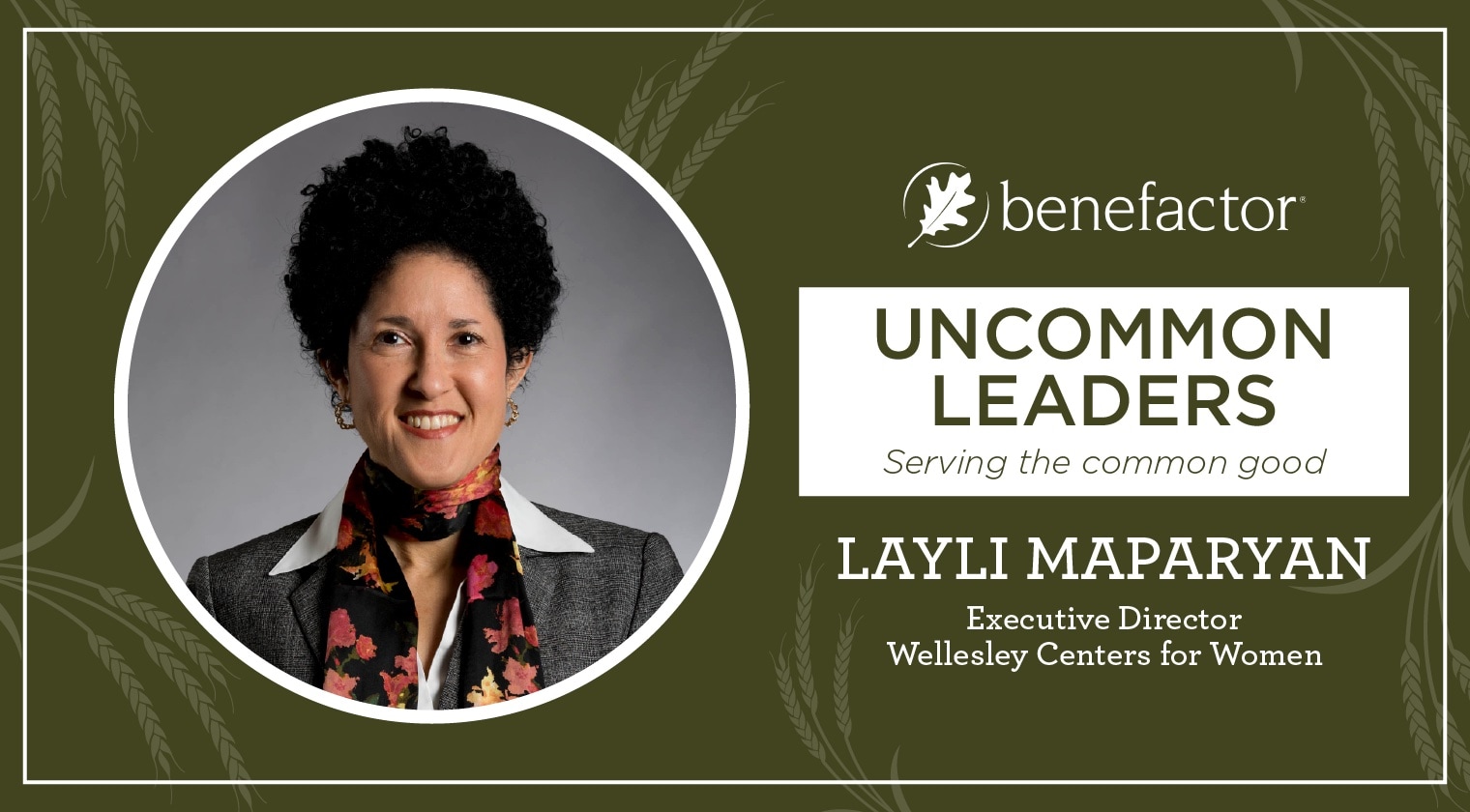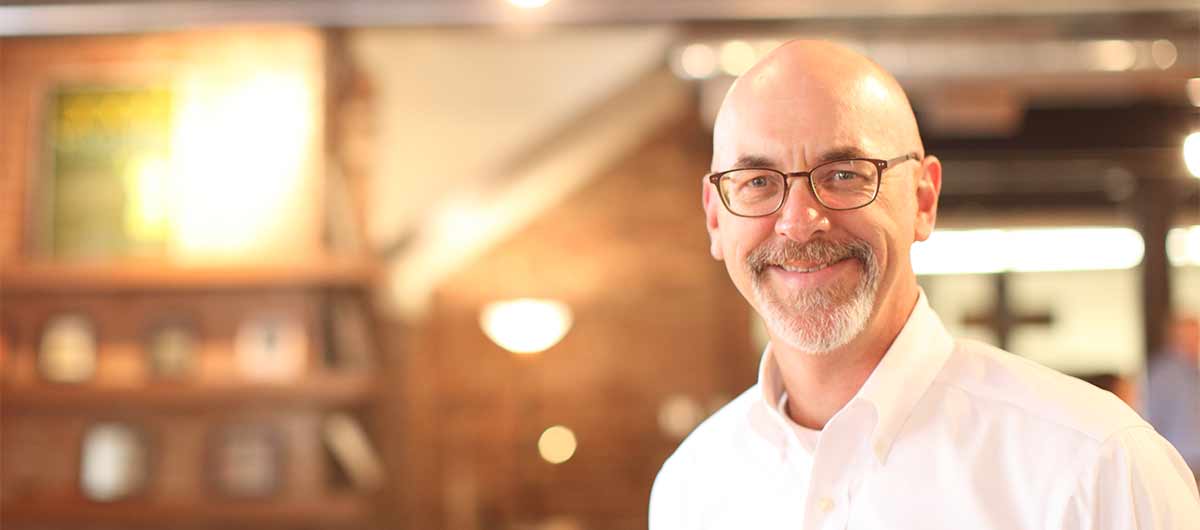About the Leadership Series
Good leadership is easy to spot, but hard to define. Popular idioms point to leadership as influence, or hope, or the ability to translate vision to reality. Some leaders are characterized by charisma, others by quiet acts of service. And debate continues over the origin of leaders: are they born, made, or something in between?
Benefactor Group is proud to counsel effective leaders of all styles and backgrounds. Through this interview series, we have asked a number of our partners, past and present, to share their personal leadership philosophies and career journeys. We found each conversation illuminating—and have shared their varied accomplishments, trials, and lessons learned below.
About Layli Maparyan
Layli is the Katherine Stone Kaufmann ’67 Executive Director of the Wellesley Centers for Women. An institute of Wellesley College, the Wellesley Centers for Women is one of the oldest, largest gender- and equality-focused research and action institutes in the nation. It has influenced change in focus areas of education, economic security, mental health, youth and adolescent development, and gender-based violence since 1974.
Most institutes focus on research; most nonprofits emphasize action. WCW does both. Research tells us what is and evaluates what works. Action programs demonstrate—to policymakers, activists, academics, the media, and everyday citizens—how research can be translated into real-world solutions. As a result, WCW contributes to a world that is better for women, girls, families, and communities.
About Layli’s Leadership
Layli Maparyan is a widely respected scholar, activist, and leader. Under her guidance, WCW has expanded its reach, flourished in reputation, and secured essential financial support despite an uncertain research funding landscape. Just last year, WCW research scientists and project directors received 40+ media mentions; presented at 50+ conferences and events; published 45+ chapters, articles, and more; and advanced 27 active research projects, including 11 new ones.
Layli exemplifies mission- and values-driven leadership. Her career—focused on the intersection of scholarship and social justice—has influenced movements for equality in enduring ways. We were pleased to learn from her experiences.
If you keep human wellbeing at the center, everything else will go well.
Our Conversation with Layli Maparyan, WCW
Tell me about your career journey. What led you to the Wellesley Centers for Women?
I started my career as a college professor, and assumed that’s what I would always do. I worked at the intersection of psychology, which is what my Ph.D. is in, and African American studies and women’s studies, disciplines concerned with society and social change. I tried to craft my career in a way that allowed me to participate in social change as an academic. Still, it felt like two tracks – and when the position was announced at WCW, it was an opportunity to bring those two threads together. I was nervous. I hadn’t taken on that type of leadership role before. But I had mentors who encouraged me, and it has been great ever since.
You mentioned your mentors. Who are some of the leaders you’ve looked up to?
Some are historical, others are people I know. Early in my career, two people who inspired me were Kenneth and Mamie Clark, a husband-wife pair of early Black psychologists. They were scholar-activists—their research helped overturn Brown v. Board of Education; their famous doll studies illustrated how segregation hurt children. I’ve always thought: wow. They were part of a huge change in society. That’s the kind of thing I want to do.
Deborah Richardson, then-head of the Atlanta Women’s Foundation, inspired me to take the WCW position. She’s known me a long time; we worked on womanist projects in the community together. She asked about WCW’s budget. It felt like a big number to me! But she assured me: “there will be staff to support you; you’ll know what to do in no time.” So I took the plunge.
What is it that you admired most in those individuals? Their academic rigor? The power of their intellect? Something else?
It’s different qualities in different people—though in all of them, what I’ve admired most was their ability to contribute to social justice. With Deborah, I looked up to her executive ability. She is an excellent CEO: good at managing and connecting networks of people. I didn’t know the Clarks personally, but what inspired me was how intentional they were in using their scholarly capital to achieve social justice. I’ve always thought that is a powerful thing to do with your career.
WCW was one of the first leadership positions of this kind you’d taken on. Was there a moment you realized: “I’m a leader”?
It took time to get used to that! I came in with an attitude of servant leadership. I told our team, my goal is to help you do what you do better. I’ve always been comfortable being a facilitator in that way. But the idea of executive authority takes getting used to. People still remind me, “you know, that person is acting that way because you’re an authority figure.” I like to think of leadership as facilitation, and as being able to execute on big visions with complex, moving parts. Those are the parts of the role I most identify with.
I’m interested in the vision-setting piece of that. Is that something you purposely set out to do, or do you see it more as an instinct?
I’m a planner by temperament. Having a vision, understanding its components, identifying which levers need to be pressed to set causal chains in motion—that’s the kind of thinking I tend to do by virtue of my personality.
There is another figure who inspires me: Shoghi Effendi, who led the worldwide Bahá’í community when it was at its most global. His master planning—his ability to see the globe at once, to be aware of what was occurring everywhere—was essential. Growing up, I absorbed that example because it synched with my planning personality. It’s possible to have a big vision, understand the moving parts, put the right people in place, and motivate them.
Encouraging others is a focus of my leadership style. As I get to know people, I become aware of their real talents—and am always considering: how can this person realize their highest and best gifts?
Is there a leadership philosophy you subscribe to?
I see leadership as a form of service to humanity. That’s my own North Star. Leadership isn’t supposed to feed your ego. It’s taking your strengths and talents, and deploying them to serve humanity. And if you have the capacity to organize other people in bigger and bigger endeavors, that’s what you do. That’s what leadership means to me.
Leadership isn’t supposed to feed your ego. It’s taking your strengths and talents, and deploying them to serve humanity.
What makes a good leader? Or, on the flip side – what makes a bad leader?
There are many types of good leaders—as there should be! To keep the world in motion takes many skills and talents. I think anyone recognizing their best talents and using them with intentionality to serve others can be a leader. The only bad leaders are those who are in it for themselves. Selfishness is the worst trait a leader can have—well, maybe the gateway to the worst trait, because some leaders are actually harmful to others. Bad “leadership” is using one’s authority to harm others. That’s not even leadership. But still, we see people in positions of power doing that.
You spoke of tremendous leaders earlier: people with hugely global perspectives, or executive skills. Are those innate traits? Are leaders born or made?
Both/and. People are born with certain attributes—and to be a leader, you need a somewhat bold temperament; you have to want to be out there doing things. But you also have to learn! It’s not possible to be a good leader without learning along the way.
Leaders can be introverts or extroverts; they can have formal education or not. It’s about having the traits that are the best match for the community, place, or situation you’re in. I think the best way to train leaders is to help people know who they are: their strengths, weaknesses, how they best work with others.
What are some of the ways you’ve tried to strengthen your own leadership skills?
Some of my methods are academic. If I see a good leadership book, I’ll read it. I’m also not shy about telling people I admire that I admire them. I observe how other people work, and keep a mental check list: do this, don’t do this. There are some people who are mentoring me and don’t even know it – I’m just paying attention to them.
What is the most rewarding part of leading people?
When I see other people flourishing. I’m at the age where students from my life as a professor are now showing big success. They’ve founded organizations, written best-sellers, and helped people in so many fields. I feel deep pride that I could play a role in their journey. Similarly, when our researchers at WCW receive grants, publish work that adds new information to the discourse, or otherwise flourish, it is incredibly rewarding.
One unique aspect is that I had a kid while in college—and so I have been a mentor to other women in similar situations. It can be a difficult position. I’ve seen women who want to quit, who feel they can’t keep doing this. I continue to say: yes, you can. Let me tell you how. Let’s line up the supports you need. Let’s get you through this.
Are there unique challenges, opportunities, or moments of solidarity that exist for women in leadership roles?
Oh, definitely. Women have many common experiences on their leadership journey. Almost every woman can refer to some obstacle she’s faced because of her gender: whether while pursuing education, entering a chosen field, or being the only woman in the room. The same is true for people who are African American, or LGBTQIA, or have disabilities—you can find solidarity with others who have been on that same journey. Often, the support you get from those groups is what helps you succeed.
What have been some of the more challenging parts of being a leader?
I want the communities I’m responsible for—be it an academic department, WCW, or a board I’m on—to remain cohesive, to not split apart from the inside. We can’t let disagreement or conflict undermine our community’s cohesiveness. I’m not talking about people sharing different opinions. I mean the interpersonal conflicts that can become toxic.
A specific way that manifests is related to these times. Our country is in a very politically divided moment. People’s identities are tied up with how they vote. Because my religion forbids party affiliation, I’ve been in an interesting position as the leader of a women’s organization that is often associated with a particular perspective. I promote issues and advocate for the benefit of people. But I can’t endorse political candidates. In these divided times, people expect me to take sides. However, I never want people to feel they can’t be a part of what’s good for women because of their affiliations or views. I want to keep a big tent, an open door, a place at the table for everyone. Even within WCW, there are differences of opinion. I don’t agree with everyone. But I have to make sure there’s room for everyone, that we remain a community.
How do you do that – how do you make a place at the table for everyone?
First, by articulating that upfront as my vision, principle, and expectation. Second, by getting to know each person individually – what drives them, what’s important to them, what they want to achieve. Third, when we bump heads, always circling back to where we can find points of connection. And fourth, encouraging others to do the same.
A leader is also a manager. Conflict resolution is part of that – so is encouraging your team to grow. How do you inspire the best performance from your team?
When I began at WCW, I met with every person at the organization, close to a hundred people. We talked anywhere from 30 minutes to 2 hours. It took several months! Every few years, I do that. You get the best out of people when you know them and understand their talents.
I can remember one of our researchers was starting a new area of work when I arrived. She studies social media and youth, which was rare eight or nine years ago. I told her: I see you initiating this; it’s going to be big; I want you to be our expert. At the time, she was still working under another researcher. Now, she’s a recognized expert with her own lab and team. It began by acknowledging her gifts, and investing in her potential.
At WCW, we’ve also consciously said: we’re a values-driven organization. We stand for social justice, equality, and wellbeing. Our internal work life must mirror those values. One of my first actions was instituting a flex-time policy, because work-life balance is a feminist value. We’ve also created a committee on diversity and equity. We have to walk the talk.
Things like flex time are as essential now, in this moment of COVID-19, as ever. Do you remember when you first heard about COVID-19? How did you deal with it then? Now that we are months down the road?
It’s ironic, I was on sabbatical when this started. My associate director, Tracy Gladstone, was at the helm. I returned when things grew crazy, but really, she handled it so well. She kept the community cohesive and the boat steady. Because we have many good leaders—and have nurtured leadership in one another—we were able to address the crisis with great strength.
Were there lessons you learned in the past few months?
My team is very talented, but that’s not new information! What we’ve learned is what our entire society has learned. Remote work is possible. Integrating work and childcare is challenging. For us, that has been a real laboratory because we’re a primarily woman-workforce. We’re only mid-pandemic, so there are still lessons to be learned!
What we’ve learned is what our entire society has learned. Remote work is possible. Integrating work and childcare is challenging.
Are there things you try to do every day?
Spirituality plays a big role in my leadership. It not only sets my moral compass and invests me with the principles I try to live by, but it also gives me the tools of prayer and meditation that help me maintain peace and connect with a higher power. I’m also a person who does a lot of writing and journaling. That helps to clarify my thoughts and organize my plans. I’m also very much of a family person! Friends, too—having a sister circle to turn to has always been great.
This isn’t about leadership, but as a writer, I’m curious – you’re a published author, you’ve written books, articles, reviews. What’s your approach to writing?
I don’t plan everything. I plan the point I’m trying to make – then, something will spark me to start writing. I’ll go as long as I can from that spark, then refine it later. I do tend to need long stretches of time for writing, and freedom from distractions. Reading helps, too—especially when it’s cross-pollinating, when I’m reading something unrelated that helps me make connections or inspires new thought.
Are there any books you’re reading now that you’d recommend?
It’s been hard to find time to read! I read a lot of Bahá’í texts because that’s my community life. I’m listening to two books on Audible right now…one is Destiny Disrupted: A History of the World Through Islamic Eyes by Tamim Ansary. Another is Ten Lessons for a Post-Pandemic World by Fareed Zakaria. I just started it – but I’m very curious! I’m a futurist at heart. What’s next? What are we learning? What will the new world be like?
Are there any final lessons you’d share?
I’ll just say this. If you keep human wellbeing at the center, everything else will go well.






